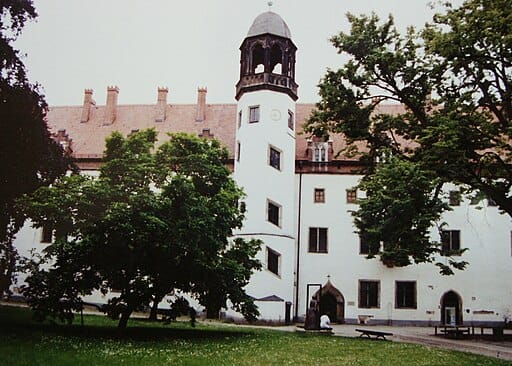Hi, I’m Pastor Lutzer. I’m actually in Wittenberg, Germany. Several of us are traveling, seeing important sites of the Reformation and other events of German history.
This is an exciting place to be. I’m actually in the courtyard where Martin Luther and his wife, Katie, would often come. Behind me there is a door, and you can actually see what it says on the door … 1540. Many people think that Katie gave it to her husband; that, of course, might be disputed, but the point is that this is where the Luthers lived, where they entertained students, and where Luther had some fights with the devil.
One of the things about the students is that Luther would sit around a table, and they would have table talks. Think about this, the things that Luther said back then, more than 500 years ago, those things are still read and studied today. Luther was very witty, very insightful. For example, He would say things like, “The Bible is like an orchard with different kinds of fruit, and we have the responsibility of finding that fruit, enjoying that fruit.” He also referred to the devil often because in those days, there was a great emphasis on the devil. But interestingly, Luther had a theology of the devil. What he said is that the devil is always interested in causing us to deny God’s Word. In the house behind me, there were times when Luther thought for sure that he was hearing the devil behind the stove. But you know what Luther believed? Once he understood God’s Word, he didn’t pay any attention to the noises behind the stove because he said that even the devil is God’s devil. In other words, even Satan is subject to the Almighty.
It is in that confidence that Luther lived during the plague here in Wittenberg. There were those who left the town. Luther said that he and Katie would stay, and if they died taking care of sick people, they would die within God’s will.
Luther is a controversial figure, of course, because he began the Reformation. He said some things about the Jews that are indeed abhorrent, but at the same time, he was able to understand the Scriptures and explain to others that we live by grace, we live by faith, and Jesus did it all.
Can I tell you one story? One day, Staupitz came to him (that’s the man who was responsible for the library here in Wittenberg) and said, “I’ve committed a great sin.” Now many of us would say to Staupitz, “What was your sin?” He had given some bad advice that turned out disastrously. We’d say, “Well, you know, Staupitz, we’ve all done that.” Luther did not minimize sin, but he magnified grace. I’m going to paraphrase what Luther said, “Oh, Staupitz, you’re a sinner. Come over to us because we are hardboiled sinners. Staupitz, you have to get over the idea that Jesus died for childish nominal sins. Oh, no. Staupitz, He died for damnable iniquities.” Luther, magnified grace, no matter how great the sin Grace was capable of forgiveness and covering our sin. Another quote Luther said, “My sin does not belong to me. Belongs to Christ.”
We’re actually in the courtyard where he and Katie would have spent many hours with students, interacting with others, and on this beautiful day in Wittenberg, we celebrate the reformer, and we’re always reminded that the just shall live by faith. Thank you so much for joining us today. God bless you.
Related
Sorry, no records were found. Please adjust your search criteria and try again.
Sorry, unable to load the Maps API.

